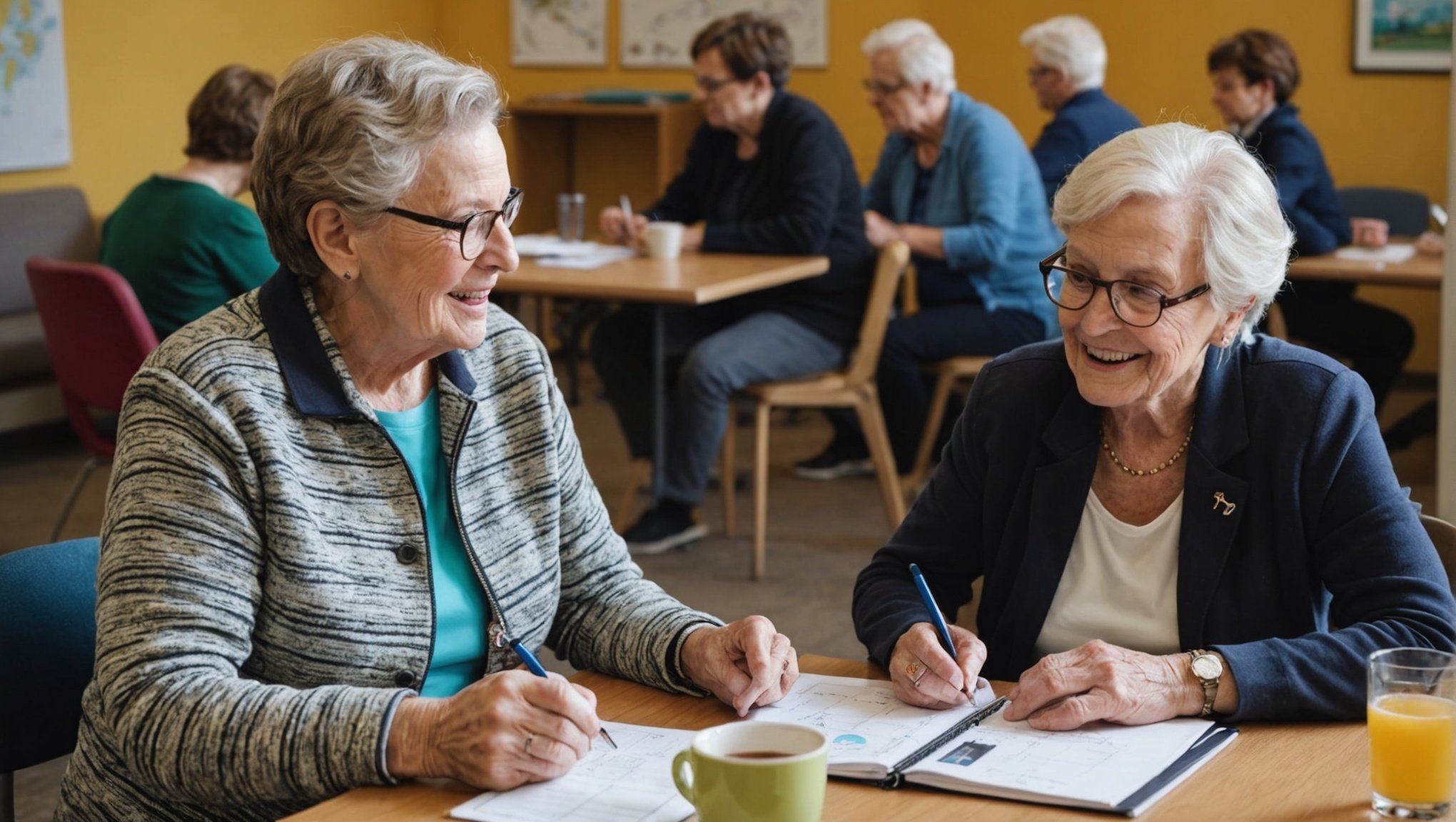As we age, social connections become vital for our well-being. Local community programs are designed to foster these connections, offering seniors a chance to engage with others and combat loneliness. From art classes to group outings, these initiatives provide enriching experiences that cultivate friendships and support networks. This exploration reveals how such programs can strengthen bonds, enhance quality of life, and encourage active participation in the community, ultimately benefiting seniors and those around them.
Overview of Community Programs for Seniors
Community programs for seniors play a vital role in fostering social connection and combating loneliness. As we age, maintaining social ties becomes increasingly important for mental and emotional well-being. These programs offer a myriad of opportunities for seniors to engage with others, ensuring they remain active and connected.
Additional reading : Exploring the Impact of Omega-6 Fatty Acid Intake on Inflammation in Older Adults
Types of community programs vary widely, catering to diverse interests and needs. Many communities offer recreational activities such as art classes, book clubs, and fitness sessions, which not only provide entertainment but also encourage physical activity and creativity. Educational workshops and lectures keep seniors mentally stimulated and informed about various topics, from technology to health and wellness.
Social gatherings, like coffee mornings or lunch clubs, are designed specifically to promote interaction among seniors, helping to build friendships and a sense of belonging. Volunteering opportunities also exist, enabling seniors to contribute to their communities, which can be deeply fulfilling and provide a sense of purpose.
Have you seen this : Unlocking Joy: The Transformative Effects of Music Therapy on Seniors Facing Cognitive Decline
These programs are instrumental in addressing loneliness and isolation. By participating, seniors can develop meaningful relationships and a support network, reducing feelings of solitude. Ultimately, community programs for seniors are essential in enhancing quality of life, ensuring they remain engaged and connected with the world around them.
Types of Community Programs Available
Community programs for seniors offer a wide variety of engagement opportunities that address different interests and needs. These programs are designed to keep seniors active, connected, and fulfilled.
Social Clubs and Gatherings
Social clubs and gatherings are a popular type of community program. They offer seniors a chance to meet regularly, fostering friendships and a sense of community. Activities like coffee mornings, lunch clubs, and themed events provide a relaxed environment for social interaction. This type of engagement is crucial for combating loneliness and enhancing emotional well-being.
Educational Workshops
Educational workshops provide seniors with opportunities to learn and grow. These workshops cover a range of topics, from technology to health and wellness, keeping seniors informed and mentally stimulated. By participating in these activities, seniors can stay up-to-date with current trends and gain new skills, boosting their confidence and independence.
Volunteer Opportunities
Volunteer opportunities allow seniors to contribute meaningfully to their communities. Volunteering not only provides a sense of purpose but also helps seniors build connections with others. By engaging in volunteer work, seniors can share their knowledge and experience, making a positive impact while enhancing their own sense of fulfillment.
Benefits of Participating in Local Programs
Engaging in local programs offers numerous benefits of social programs for seniors, significantly impacting their overall well-being.
Mental Health Benefits
Participation in community activities can lead to improved mental health and well-being. By engaging with others, seniors can experience reduced feelings of loneliness and depression. Social interactions foster a sense of belonging and purpose, contributing to a more positive outlook on life. The mental health benefits are profound, as seniors who are socially active tend to report higher levels of happiness and satisfaction.
Physical Health Benefits
Local programs also offer physical health benefits by encouraging seniors to participate in activities that promote movement and exercise. Regular physical activity is crucial for maintaining mobility, flexibility, and strength. Whether through fitness classes, dance sessions, or walking groups, these programs help seniors stay active, which can lead to better physical health outcomes and a reduced risk of chronic conditions.
Development of New Skills and Friendships
Beyond health, participating in local programs enables seniors to develop new skills and friendships. Engaging in workshops or classes allows seniors to learn and grow, keeping their minds sharp and engaged. Additionally, these programs provide opportunities to meet new people and form lasting friendships, further enhancing their social networks and support systems.
How to Find and Participate in Community Programs
Navigating the world of community programs can be a fulfilling journey for seniors. Understanding how to find programs for seniors is the first step towards active participation. Local libraries, community centers, and senior centers are excellent starting points. They often have bulletin boards or newsletters detailing upcoming events and activities tailored for seniors.
Once a program is identified, the next step is understanding the participation guide. Seniors should inquire about the registration process, any associated fees, and the schedule of activities. Many programs offer flexible options to accommodate varying levels of mobility and interest, ensuring inclusivity.
For families aiming to assist seniors in this journey, leveraging local resources can be invaluable. Many communities have dedicated senior services that provide transportation, assist with registration, and offer guidance on suitable programs. Families can also encourage seniors by accompanying them to initial meetings or events, helping to ease any anxiety about trying something new.
It's important to remember that participating in community programs is not just about attending events. It's about building relationships, learning new skills, and enhancing one's quality of life. By taking these steps, seniors and their families can unlock the full potential of community engagement, ensuring a vibrant and connected lifestyle.
Case Studies and Testimonials
Community programs for seniors can have a transformative impact, as evidenced by numerous success stories. For instance, consider Mary, an 82-year-old who felt isolated after moving to a new city. By joining a local art class, she not only rekindled her passion for painting but also formed lasting friendships. Her story is a testament to the power of community engagement in enhancing personal well-being.
Testimonials from seniors often highlight the profound changes these programs bring. John, a retired teacher, shares how volunteering at a community garden reignited his sense of purpose. He describes feeling "energised and fulfilled" by contributing to something meaningful. These personal experiences underscore the emotional and psychological benefits of staying active and involved.
The broader impact of community programs on societal well-being is significant. Programs that foster social interaction and skill development contribute to healthier, more connected communities. Seniors who participate often report improved mental and physical health, reducing the burden on healthcare systems. Additionally, these programs promote inclusivity, ensuring that seniors remain integral members of their communities.
Through these stories and testimonials, the tangible benefits of community programs for seniors become clear, offering inspiration and encouragement for others to engage and thrive in their later years.
Additional Resources and Support Networks
Navigating the landscape of community programs can be greatly enhanced by tapping into additional resources for seniors. Numerous community organizations are dedicated to providing support, ensuring seniors can access the programs they need.
- Senior Centres: Often serve as hubs for information, offering brochures and advice on local activities.
- Local Libraries: Provide bulletin boards and digital resources listing community events.
- Non-Profit Organizations: Groups like AARP or Age UK offer guidance and support tailored to senior needs.
For those seeking online resources, websites like ElderCare Locator and Senior Resource provide directories and forums where seniors can explore various community programs. These platforms are invaluable for discovering activities that align with personal interests and mobility levels.
Creating a support network within a community is crucial for fostering a sense of belonging. Seniors can start by joining local clubs or volunteering, which naturally leads to forming connections. Encouraging participation in neighborhood events or group activities can further strengthen these networks. Family members can assist by introducing seniors to these resources, helping to build a robust support system that enhances both social engagement and personal well-being.











